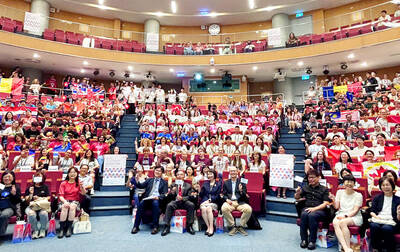European companies in China yesterday called for greater market access and a level playing field with Chinese rivals amid growing frustration among foreign firms over perceived unfair treatment.
An EU Chamber of Commerce position paper said uneven enforcement of laws and unfair restrictions on foreign investment were deterring overseas companies from expanding their operations in China.
“This is not because European companies do not want to expand their China operations ... but rather because they face obstacles or risks in excess of what their boards and stakeholders will allow them to bear,” said Jacques de Boisseson, president of the business group.
The paper was the latest in a growing chorus of complaints from foreign firms that China’s business environment was worsening.
It called on Beijing to consult more with foreign firms on policy decisions and urged the EU to develop a common China policy.
“A single market needs a single and proactive economic and trade policy towards China,” Boisseson said.
Despite repeated assurances from top leaders that foreign investment was welcome in China, there was a “growing tendency” in sectors such as auto, telecoms and healthcare to block overseas companies from the market.
These hurdles were prompting some European companies to reconsider their presence in China, Boisseson said.
“There are sectors of the Chinese economy ... that would probably be satisfied with a lower level of foreign investment,” he said.
Beijing last month urged officials to implement policies aimed at encouraging foreign investment, in an apparent response to the criticism by foreign governments and firms over perceived unfair policies and market restrictions.
Surveys by the US and European chambers of commerce in recent months showed overseas firms were increasingly unhappy with the way they were treated in China.
Separately, a US federal grand jury has indicted 11 German and Chinese executives for conspiring to illegally import more than US$40 million of honey from China, the US Justice Department said on Wednesday.
In an example of what US Senator Charles Schumer has called “honey laundering,” they were accused of mislabeling honey made in China as coming from Russia, India, Indonesia and elsewhere to avoid nearly US$80 million in anti-dumping duties.
Some of the honey was also adulterated with antibiotics not approved for use in honey production, the department said. However, the 44-count indictment handed down in Chicago does not allege any cases of illness or risk to public health.
Ten of the indicted individuals were top executives of German food conglomerate Alfred L Wolff GmbH, or four of its affiliated companies, whose US honey-importing business was based in Chicago, the department said.
A Chinese sales manager for China-based QHD Sanhai Honey Co (秦皇島三海蜂業) was also indicted, as was the company itself, the German firm Alfred L Wolff GmbH and affiliates in the US and China.

TAIWAN IS TAIWAN: US Representative Tom Tiffany said the amendment was not controversial, as ‘Taiwan is not — nor has it ever been — part of Communist China’ The US House of Representatives on Friday passed an amendment banning the US Department of Defense from creating, buying or displaying any map that shows Taiwan as part of the People’s Republic of China (PRC). The “Honest Maps” amendment was approved in a voice vote on Friday as part of the Department of Defense Appropriations Act for the 2026 fiscal year. The amendment prohibits using any funds from the act to create, buy or display maps that show Taiwan, Kinmen, Matsu, Penghu, Wuciou (烏坵), Green Island (綠島) or Orchid Island (Lanyu, 蘭嶼) as part of the PRC. The act includes US$831.5 billion in

The paramount chief of a volcanic island in Vanuatu yesterday said that he was “very impressed” by a UN court’s declaration that countries must tackle climate change. Vanuatu spearheaded the legal case at the International Court of Justice in The Hague, Netherlands, which on Wednesday ruled that countries have a duty to protect against the threat of a warming planet. “I’m very impressed,” George Bumseng, the top chief of the Pacific archipelago’s island of Ambrym, told reporters in the capital, Port Vila. “We have been waiting for this decision for a long time because we have been victims of this climate change for

Taiwan is hosting the International Linguistics Olympiad (IOL) for the first time, welcoming more than 400 young linguists from 43 nations to National Taiwan University (NTU). Deputy Minister of Education Chu Chun-chang (朱俊彰) said at the opening ceremony yesterday that language passes down knowledge and culture, and influences the way humankind thinks and understands the world. Taiwan is a multicultural and multilingual nation, with Mandarin Chinese, Taiwanese, Hakka, 16 indigenous languages and Taiwan Sign Language all used, Chu said. In addition, Taiwan promotes multilingual education, emphasizes the cultural significance of languages and supports the international mother language movement, he said. Taiwan has long participated

MASSIVE LOSS: If the next recall votes also fail, it would signal that the administration of President William Lai would continue to face strong resistance within the legislature The results of recall votes yesterday dealt a blow to the Democratic Progressive Party’s (DPP) efforts to overturn the opposition-controlled legislature, as all 24 Chinese Nationalist Party (KMT) lawmakers survived the recall bids. Backed by President William Lai’s (賴清德) DPP, civic groups led the recall drive, seeking to remove 31 out of 39 KMT lawmakers from the 113-seat legislature, in which the KMT and the Taiwan People’s Party (TPP) together hold a majority with 62 seats, while the DPP holds 51 seats. The scale of the recall elections was unprecedented, with another seven KMT lawmakers facing similar votes on Aug. 23. For a